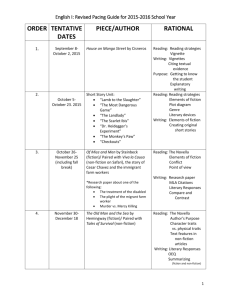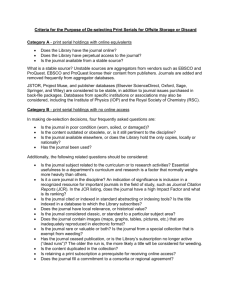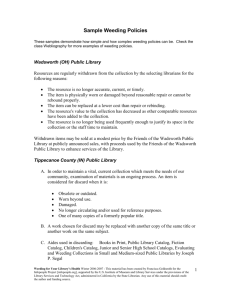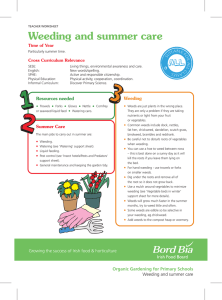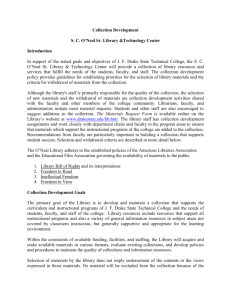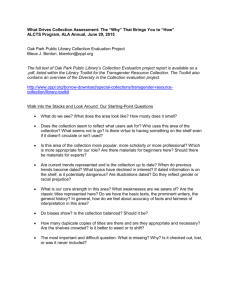Policies - Chatsworth Township Library
advertisement
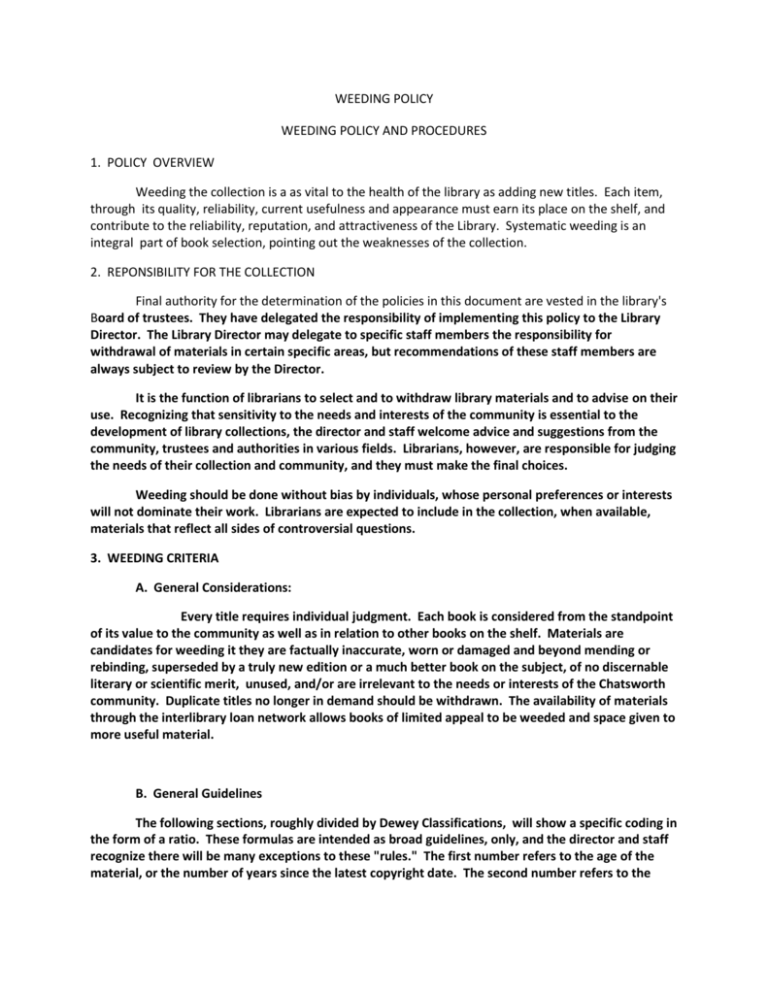
WEEDING POLICY WEEDING POLICY AND PROCEDURES 1. POLICY OVERVIEW Weeding the collection is a as vital to the health of the library as adding new titles. Each item, through its quality, reliability, current usefulness and appearance must earn its place on the shelf, and contribute to the reliability, reputation, and attractiveness of the Library. Systematic weeding is an integral part of book selection, pointing out the weaknesses of the collection. 2. REPONSIBILITY FOR THE COLLECTION Final authority for the determination of the policies in this document are vested in the library's Board of trustees. They have delegated the responsibility of implementing this policy to the Library Director. The Library Director may delegate to specific staff members the responsibility for withdrawal of materials in certain specific areas, but recommendations of these staff members are always subject to review by the Director. It is the function of librarians to select and to withdraw library materials and to advise on their use. Recognizing that sensitivity to the needs and interests of the community is essential to the development of library collections, the director and staff welcome advice and suggestions from the community, trustees and authorities in various fields. Librarians, however, are responsible for judging the needs of their collection and community, and they must make the final choices. Weeding should be done without bias by individuals, whose personal preferences or interests will not dominate their work. Librarians are expected to include in the collection, when available, materials that reflect all sides of controversial questions. 3. WEEDING CRITERIA A. General Considerations: Every title requires individual judgment. Each book is considered from the standpoint of its value to the community as well as in relation to other books on the shelf. Materials are candidates for weeding it they are factually inaccurate, worn or damaged and beyond mending or rebinding, superseded by a truly new edition or a much better book on the subject, of no discernable literary or scientific merit, unused, and/or are irrelevant to the needs or interests of the Chatsworth community. Duplicate titles no longer in demand should be withdrawn. The availability of materials through the interlibrary loan network allows books of limited appeal to be weeded and space given to more useful material. B. General Guidelines The following sections, roughly divided by Dewey Classifications, will show a specific coding in the form of a ratio. These formulas are intended as broad guidelines, only, and the director and staff recognize there will be many exceptions to these "rules." The first number refers to the age of the material, or the number of years since the latest copyright date. The second number refers to the maximum number of years without usage. An "X" in the place of a number indicates that no clear default number of years is applicable. 000 (General) : Encyclopedias 5/X The shelf-life for materials in this range is generally good for about five years, unless they are specialized and very dated items, like almanacs and computer guides, which are good for two years. 100 (Philosophy and Psychology) : 10/5 The collection should keep abreast of popular topics in psychology. The value of philosophy is determined mainly by use. 200 (Religion and Mythology: 10/5 The collection should have something up-to-date on each religion represented in the Chatsworth area, provided such materials are available. Generally the shelf-life for items in this range is ten years except for areas of rapid change. 300 (Social Sciences) : 10/3 Books on government and economics should be replaced by new editions as available. Unless they have an historical approach they are of little use after ten years. Books on finance, opportunities for wage earners, college guides, educational testing are outdated sooner. Books on customs and etiquette may have a longer shelf life depending on whether the subject matter is consistent with current ideas. Books on folklore may be kept well beyond ten years, depending on condition. 400 (Linguistics and language) : 10/5 Need only stock dictionaries and grammar instruction for languages being (or likely to be) studied or spoken in Chatsworth. 500 (Pure Sciences) : 10/3 Mathematics, general biology, natural history and botany have a shelf-life of ten years, but other sciences may be dated much sooner as new research supersedes earlier data. Basic works of significant historical or literary value, such as Darwin's Origin of Species should be kept indefinitely. 600 (Applied Sciences and Technology) : 7/3 Technology is making such rapid advances that material over sevn years old should be viewed with suspicion with obvious exceptions. Repair manuals for older cars and appliances should be retained as long as such items are generally used in Chatsworth. Books on clocks guns, and toys may be kept beyond ten years since items are often collectable, Cookbooks, unless unused, also enjoy a much longer shelf life. Books on medicine (except anatomy and physiology) and home economics become dated much sooner as style and technique change rapidly. 700 (Arts and Recreation) : This range generally enjoys a relatively long shelf life, and most items may be kept, especially histories of art and music, until worn and unattractive. Books on crafts (X/3) may be retained if they contain basic technique and are well illustrated. Books on photography (7/3) should be checked for outdated technique and equipment. Books on sports (7/3) should be weeded if they deal with personalities no longer of interest. 800 (Literature): (X/X) Keep basic materials, especially criticism of classic writers. Discard works of writers no longer read or discussed in literary histories (such as poetry, drama, essays or letters). Discard minor writers no longer read in area schools, unless there is an established demand among non-students. Keep literary histories unless they are superseded by better titles. 900 (History and Geography) : 15/3 Books on history generally enjoy a longer shelf life than most of the collection. The main factors include demand, accuracy of facts, and fairness of interpretation. Personal narratives and war memoirs of WW II, the Korean War, and the Indochina wars may be weeded in favor of broader histories of these conflicts, unless the author is a local person, or the book is cited in a bibliography as outstanding in style or insight. Dated viewpoints should be discarded. Books on travel (4/2) become dated much more rapidly, however personal narratives of travel (10/3) enjoy a somewhat longer shelf life, especially if they are of high literary or historical value. All local material and accounts in which local people have participated should be kept. Biography : X/3) These books are shelved separately in the Children's, Young Adult and Adult collections. Unless the person treated is of permanent interest or importance, biographies may be weeded as demand stops, This applies especially to ghost written biographies of faddish celebrities. Poor quality biographies of major celebrities should be replaced with better ones if funds permit, Biographies of outstanding literary value are to be kept until worn, without regard to the subject's reputation Adult Fiction : (X/3) Discard works no longer popular, especially second and third copies or old best sellers. Retain works of durable demand or high literary merit, good non-topical well written novels appealing to universal concerns will circulate for many years. Large Print : (X/3) Mass Market Paperback: (X/1) Children's Fiction : (X/3) Discard books where the format and reading level are no longer appropriate to the current interest level of the book; topical fiction on dated subjects; abridged or simplified classics to be replaced by the original; second and third copies of series books no longer popular Children's Non-Fiction : Use the same criteria as adult but looking especially for inaccuracy and triviality, the more common faults of over-simplified children's non-fiction. Young Adult Fiction : Use the same criteria as children's fiction Young Adult Non-Fiction: Use the same criteria as adult non-fiction. Periodicals : (5/X) Microfilm copies of heavy demand magazines and newspapers useful for research . Because of space restrictions, back files of magazines are generally kept for no more than one year. Newspapers are generally kept for no more than several weeks. Standard news magazines should be retained for three years. National should be retained indefinitely. Local Document Repository These documents by design cover issues with widely varying life spans in local interest and impact. All documents accepted for the public information repository are accepted with the understanding that the director and board of trustees will determine when these documents are no longer valuable to the library. Criteria for this decision will include the amount of use the document received, the currency and the local relevance of the issue it concerns, the available library space, and the format of the materials. Audio-Visuals : (X/3) Worn out or damaged, rarely used, trivial and faddish are the general criteria taken into consideration when weeding audio-visual items. 4. FREQUENCY OF WEEDING Weeding should not b e a major project undertaken once every several years of when there is no longer room to shelve the materials. The collection as a whole should be reviewed systematically, one section at a time, each book should be considered individually, keeping in mind the general selection criteria and the terms in the above section on weeding criteria. Some sections will require more frequent review than others. The following chart will serve as a very broad guideline for the frequency each section should be reviewed. DEWEY RANGE YEARS BETWEEN REVIEW 000 3 100 4 200 5 300 3 400 5 500 2 600 2 700 3 800 5 900 4 Biography 2 Fiction 2 Large Print 2 Paperbacks 1 Children's 2 Young Adult 3 Audio-Video 5 5. DISPOSAL SELL: Most books discarded from the library are sold through the periodic book sale. RECYCLE: While not as "profitable" as selling the items, this option can generate the best public relations when discarded materials are passed along to other agencies (i.e. schools, day care providers, nursing homes, jails, third world countries) DESTROY: Generally reserved for the worst books that no one wants or would buy at the book sale. REQUESTS FOR PURCASE: Occasionally the Chatsworth Township Library will receive a request from a reader to be given the opportunity to purchase a book or item from the library's collection when it is to be weeded. It is unreasonable to assume library employees can track such request, nor will such requests impact the library's decision whether an item should be withdrawn. Persons making such requests are advised to check the periodic book sales.
